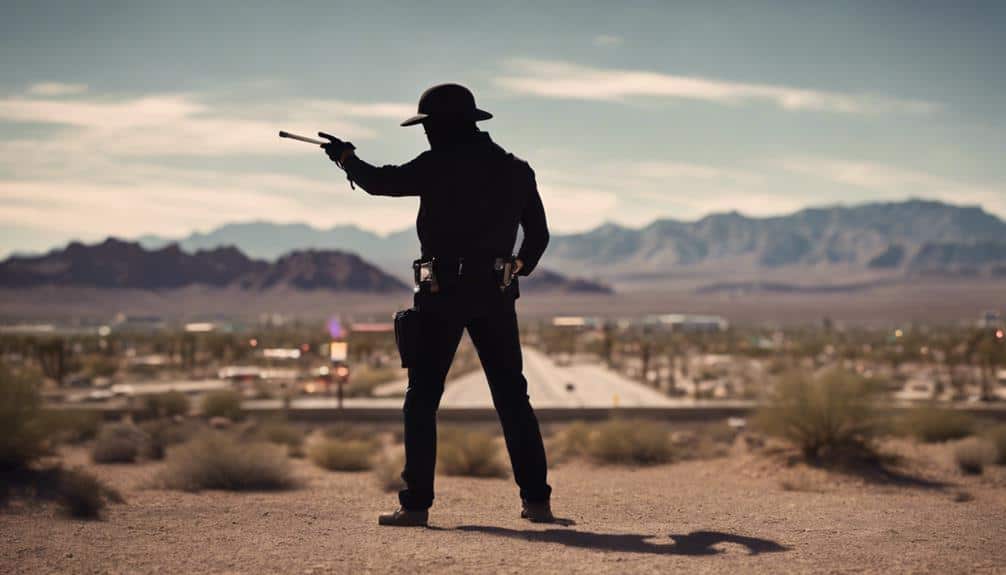In Nevada, carrying a
collapsible baton is a definite no-go. Classified as a
prohibited weapon, possessing one could land you in hot water, potentially facing serious legal consequences including misdemeanor or even felony charges! While open carry laws are friendly towards many weapons, collapsible batons don’t make the cut. Instead, why not consider
legal alternatives like pepper spray or a trusty stun gun for
self-defense? These options keep you within the law and just as ready to protect yourself. Always remember, staying informed about local weapon laws is key to staying out of trouble and ensuring your safety. Interested to know more?
Nevada’s Weapon Laws Overview
Maneuvering
Nevada’s weapon laws can be challenging, especially when it comes to items like
collapsible batons. These nifty, James Bond-esque gadgets may seem like handy
self-defense tools, but under Nevada law, they’re a no-go. That’s right, collapsible batons are
illegal to carry, and not just in a slap-on-the-wrist kind of way. We’re talking
serious consequences here. The state emphasizes the importance of understanding the legal implications of self-defense tools, as well as the potential use of alternatives like the
12 Inch Telescopic Steel Baton, which, while still regulated, may offer a different legal standing.
In the Silver State, Chapter 202 of the Nevada Revised Statutes lays down the law on weapons, and it’s pretty clear: collapsible batons fall under the category of
prohibited weapons. While Nevada generally allows the
open carry of most weapons, collapsible batons don’t make the cut. So, if you’ve got one tucked away for a rainy day, you’re skating on thin ice.
Local jurisdictions can pile on extra restrictions, so what’s forbidden in Las Vegas might have even stricter penalties in Reno. If you’re caught with one, especially if you intended to use it for self-defense or combat, you could face
felony charges. So, next time you’re tempted to channel your inner action hero, remember, in Nevada, it’s best to leave the collapsible baton at home.
Definition of Collapsible Baton
Understanding why collapsible batons are prohibited in Nevada starts with knowing what they actually are. A collapsible baton, sometimes called an expandable baton, is a self-defense weapon that can extend for use and collapse for easy storage and transport. These nifty gadgets are typically made of metal or composite materials, and when fully extended, they often measure between 16 to 26 inches. Picture a telescoping rod that fits in your pocket but can quickly turn into a formidable stick.
So, why’s everyone so wary of them? Well, collapsible batons are designed for close-quarters self-defense, capable of delivering significant impact without the lethality of firearms. However, in Nevada, the possession and carry of these batons are illegal. This means you can’t legally own or carry them in public spaces, even if they seem like the perfect non-lethal self-defense tool.
Here’s a quick breakdown:
- Materials: Metal or composite
- Size: 16 to 26 inches extended
- Purpose: Close-quarters self-defense
Always remember, local jurisdictions might add their own twists to the rules, so checking specific regulations is a must if you don’t want to find yourself unintentionally carrying concealed, and, well, in a bit of legal trouble.
Legal Self-Defense Options
When it comes to
legal self-defense options in Nevada, there are several effective tools you can use without running afoul of the law. While carrying a
collapsible baton is illegal and can result in severe penalties, you’ve got plenty of other choices to guarantee your safety. For example, the
Peace KEYper Self-Defense Tool is a compact and discreet option for personal protection, easily fitting on your key ring or in your pocket.
For starters,
handguns are a popular option for personal protection. As long as you have the proper permits and follow state guidelines, you can carry a
concealed firearm. If firearms aren’t your thing,
stun guns and
Tasers are fantastic alternatives. They provide a non-lethal way to incapacitate an attacker, giving you time to escape. And don’t forget
pepper spray—it’s easy to carry, legal, and incredibly effective in warding off threats.
Knives are also an option, but you need to be mindful of
blade length regulations. Some local laws may have additional restrictions, so it’s wise to verify these rules before carrying one. Finally,
open carry of most self-defense weapons is permitted in Nevada, as long as they’re in plain view. So, whether you’re walking down the Strip or hiking in Red Rock Canyon, make sure your self-defense tools are both legal and visible.
Self-Defense in Nevada
In Nevada, you’re legally allowed to defend yourself when you perceive an immediate threat, as long as you use reasonable force. That means if someone tries to harm you, you can fight back, but you mustn’t go overboard. It’s all about proportionality—you can’t use excessive force.
When it comes to self-defense tools, batons are legal, but there’s a catch. If you want to carry a collapsible baton, it must be done openly. Concealed carry of a baton requires a permit, just like a firearm. So, no sneaking it up your sleeve like a secret agent unless you’ve got the paperwork to back it up.
Here are some key points to keep in mind:
- Reasonable force: Only use the amount of force necessary to stop the threat.
- Legal carry: Openly carry your baton or get a concealed carry permit.
- Situation matters: Being involved in illegal activities can void your self-defense claim.
Think of it this way—if you’re walking down Las Vegas Boulevard and someone threatens you, you can whip out your baton, but make sure it’s not hidden in your jacket pocket unless you’ve got that concealed carry permit. Remember, the key is to act within the law while protecting yourself.
Stand Your Ground Law
When you’re carrying a collapsible baton in Nevada, you should know that the state’s
Stand Your Ground Law means you don’t have to retreat if you’re legally in a place and face an
immediate threat. Imagine you’re walking down a street where you have every right to be, and suddenly someone confronts you aggressively—Nevada law allows you to use
deadly force if you reasonably believe it’s necessary to protect yourself. Just remember, this protection vanishes if you’re the one who
started the fight or were up to no good in the first place!
No Duty to Retreat
Nevada’s “Stand Your Ground” law empowers you to protect yourself using deadly force without the need to retreat, provided you’re lawfully present at the scene of the threat. This means that if you’re minding your own business and someone threatens you, you don’t have to run away—you have the right to stand your ground and defend yourself. Whether you’re carrying a collapsible baton or just your bare hands, the law is on your side.
To invoke this defense, you must meet certain conditions:
- You must not be the original aggressor: If you started the fight, forget about claiming self-defense.
- You must have a reasonable belief of imminent danger: You need to genuinely believe that you or others are in immediate danger of bodily harm.
- You must be lawfully present: Engaging in illegal activities at the time of the confrontation? Sorry, no “stand your ground” for you.
This law reinforces your right to defend yourself without the obligation to escape from a potentially dangerous situation. Imagine you’re at a park, enjoying the day, and someone attacks you. Thanks to Nevada’s “Stand Your Ground” law, you can use your collapsible baton to protect yourself without needing to run away. So, always be prepared, but remember the rules!
Lethal Force Justification
Envision facing a sudden,
life-threatening situation where every second counts. In Nevada, a “stand your ground” state, you’re not required to retreat if you perceive an imminent threat. Understanding
lethal force justification is essential if you carry a
concealed weapon, like a collapsible baton.
To claim
self-defense, you mustn’t be the
original aggressor. Imagine this: you’re minding your own business when a stranger threatens you with a knife. You have the right to respond with force, but only if you reasonably believe you’re in
immediate danger. The force you use can’t exceed what’s necessary to stop the threat. So, pulling out a collapsible baton is justified, but going beyond reasonable force isn’t.
Another key point: you must have a
right to be where the incident occurs. If you’re on your property or in a public place where you’re legally allowed, you’re covered. However, participating in illegal activities at the time negates your claim. So, stay on the right side of County law. Remember, a touch of humor: don’t bring a baton to a pie fight—pick your battles wisely and make sure your actions are justified under Nevada’s
stand your ground principles.
Legal Location Requirements
Understanding where you can legally use force is critical under Nevada’s Stand Your Ground law. When you’re carrying a collapsible baton, knowing these laws can mean the difference between lawful self-defense and legal trouble. In Nevada, you don’t have to retreat if faced with a perceived threat, but you must be in a location where you have a right to be. For instance, if you’re in your home, your car, or even walking down the street, you can stand your ground.
To legally employ the Stand Your Ground law with a collapsible baton:
- You can’t be the original aggressor. If you started the fight, claiming self-defense won’t fly.
- You need a reasonable belief of imminent harm. This means you truly think you’re about to get hurt.
- You must not be engaged in illegal activities. If you’re breaking the law, self-defense claims are off the table.
Prohibited Weapons List
When it comes to the
prohibited weapons list in Nevada, you should know that
collapsible batons aren’t just frowned upon—they’re flat-out
illegal. Because these batons fall under the category of
dangerous weapons, carrying one can lead to some serious legal consequences, including criminal charges that could seriously disrupt your life. And don’t think you can dodge the rules by hopping from one town to another; local jurisdictions might have even stricter regulations, so always double-check to avoid any nasty surprises.
Restricted Weapon Categories
Nevada’s legal framework places collapsible batons squarely on the prohibited weapons list, categorizing them as dangerous and illegal for civilian possession and carry. You might think a collapsible baton is a handy tool for self-defense, but in Nevada, it’s seen as an illegal weapon. This classification means you can’t legally own or carry one, no matter how useful you think it might be.
When it comes to restricted weapon categories, Nevada doesn’t mess around. Collapsible batons fall under the broader category of dangerous weapons, which also includes other items you probably shouldn’t have in your glove box or backpack. Here’s a quick rundown:
- Explosives: No, you can’t keep dynamite as a backup plan.
- Brass Knuckles: Leave these in the movies where they belong.
- Switchblades: James Bond might have one, but you definitely shouldn’t.
Local jurisdictions can add their own flavor to these regulations, making the rules even tighter. It’s essential to stay informed about what’s off-limits. Trust me, you don’t want to face severe penalties, like felony charges, just because you thought a collapsible baton was a good idea for a hike. Stay safe and legal!
Legal Consequences Explained
The reality of carrying prohibited weapons in Nevada, like collapsible batons, carries significant legal consequences that can severely impact your life. These items are explicitly listed in the Nevada Revised Statutes (NRS) as dangerous weapons, making it illegal to conceal them. Ignoring these laws can lead to severe penalties, including potential felony charges that could haunt you for years.
Legal Consequences of Carrying Collapsible Batons
| Violation |
Potential Penalty |
| Possession of a collapsible baton |
Misdemeanor or felony charge |
| Concealment of a collapsible baton |
Enhanced felony charge |
| Violation of local jurisdiction laws |
Additional fines and penalties |
| Carrying with intent |
Increased severity of charges |
Imagine walking down the Strip in Las Vegas, feeling invincible with your collapsible baton hidden away. Suddenly, you’re stopped by law enforcement, and that sense of security quickly evaporates. Whether you intended to use it for self-defense or not, the legal consequences are the same—Nevada laws don’t joke around. Local jurisdictions might even tack on extra restrictions, adding to your woes.
Local Jurisdiction Restrictions
Local jurisdictions in Nevada can impose stricter regulations on the possession and use of collapsible batons than state law. While Nevada state law classifies collapsible batons as prohibited weapons, some cities and counties may have even more stringent rules. Envision thinking you’re in the clear, only to find out the local jurisdiction restrictions are tighter than state regulations!
To avoid legal penalties, it’s essential to:
- Verify local ordinances: Different cities or counties may have unique restrictions on collapsible batons.
- Consult local law enforcement: They can provide the most current regulations for your specific area.
- Seek legal advice: A legal expert can help you navigate the complexities of local laws.
Ignoring these steps can lead to fines or even criminal charges. Imagine this: You’re hiking in beautiful Nevada, baton in your backpack, only to be stopped by local police who inform you that in this particular county, carrying that baton is a big no-no. Not fun, right?
Transporting Weapons Legally
When
transporting weapons legally in Nevada, you must be aware of the specific laws governing
collapsible batons. Unfortunately, collapsible batons are classified under
prohibited weapons regulations, meaning you can’t
carry them, whether openly or concealed. Yep, even if you’ve seen batons used in movies and thought they’d be cool to have for
personal defense, Nevada law says otherwise.
Now, you might be thinking, “But wait, I can own other weapons and transport them, right?” Sure, you can
legally transport many types of weapons in your vehicle, but collapsible batons aren’t allowed in this mix. Imagine driving around with a retractable baton in your glove compartment—sorry, that’s a no-no and could land you in hot water. Transportation safety is essential, but following the letter of the law is even more critical.
Always check
local jurisdiction laws before attempting to transport or carry any weapon. While carrying a concealed weapon like a handgun might have its own set of rules, collapsible batons are strictly off-limits. Ignoring this can lead to
severe penalties, so it’s best to leave that baton at home and stay on the right side of Nevada law.
Penalties for Illegal Possession
Possessing a collapsible baton in Nevada can lead to serious consequences. If you’re caught with one, you could face misdemeanor charges, which often come with fines and potential jail time. The state doesn’t take this lightly, and the penalties can be more severe if you’re found in possession during another crime.
Local jurisdictions may have their own additional restrictions and penalties, so it’s important to verify the specifics in your area. Here’s what you need to know:
- Misdemeanor Charges: Basic possession can result in fines and possibly jail time.
- Enhanced Penalties: If you’re caught with a baton while committing another crime, expect the legal hammer to come down harder, with considerably increased penalties.
- Repeat Offenses: Multiple violations can escalate the charge to a felony, leading to even more severe consequences.
Imagine getting caught twice—it could mean trading your baton for a prison baton twirling class! So, always check local laws before carrying anything that could be classified as a weapon. Staying informed and cautious can save you from these hefty penalties and keep your record clean. Stay safe and baton-free!
Frequently Asked Questions
You can carry handguns, stun guns, Tasers, and pepper spray under Nevada’s self-defense laws. Knives have specific weapon classifications and legal restrictions. Always check local regulations to guarantee compliance with varying legal restrictions on self-defense weapons.
Can Civilians Have Collapsible Batons?
You can’t carry collapsible batons as a civilian in Nevada. Baton laws prohibit their possession for civilian self-defense. Legal restrictions are strict, so possessing one could lead to severe penalties, including potential felony charges.
Is It Legal to Carry Around a Baton?
Imagine thinking you’ve got a safety net, only to find it’s illegal. Baton legality in Nevada’s strict. Self-defense laws prohibit carrying collapsible batons for personal protection. Always check local laws; penalties can be severe and unexpected.
Is Pocket Carry Legal in Nevada?
In Nevada, pocket carry laws prohibit collapsible batons due to strict legal restrictions. You can’t use them in self-defense scenarios. Always check local regulations and consult legal counsel to avoid potential penalties and legal issues.









